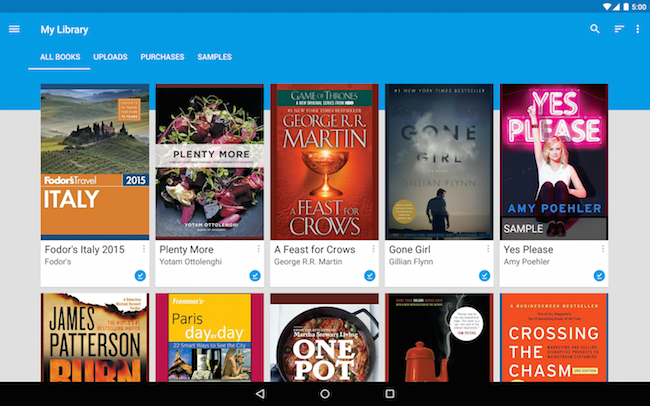
We have learned not to click on links that arrive in emails from people we do not know. We are starting to learn that mobile apps could come with some security risk as well, so we need to exercise a little caution when we choose which titles to install. What comes as more of a surprise, is that e-book you have your eyes on could be infected with malware too. Those of us on the production side of technology spend a lot of time trying to convince skeptics that e-books are just like their paper counterparts, only a lot more convenient… but last I checked, stacked and bound sheets of paper never tried to spy on you.
According to research done by Android Police, Google Play Books contains a number of books billed as guides for popular games –each one promising cracked Android application packages (APKs). Of course, it is too good to be true, and these cheater apps are loaded with malware and fishing scams (and who knows what else).
Everybody wants a deal, so when these guides can be purchased for less than the cost of the game on its own, bargain hunters find it hard to resist. Initial reactions from developers seem to suggest that users are only getting what they deserve. No matter how much I am inclined to agree, one detail should not be ignored: the only thing people will remember after they cleanse their devices, is the name of the app that got them there. Every time they tell the story of how their tablet was infected, the name of the app will come up. It doesn’t matter that it wasn’t your fault. Kind of scary, isn’t it?
Ultimately, it means developers should take a keen interest in finding a solution to this problem.
It doesn’t help that Google appears to be choosing a reactionary approach instead of working harder to actually prevent malicious material from being added to the Play Store to begin with. It makes sense I suppose, when you consider that it’s hard to boast how much different you are from The Man (read: Apple) with all of his restrictions and rules, if you are then using the same types of checks and balances to stop scammers and hackers from adding content to your store.
So what can users do to protect themselves? There are no guarantees, but I can offer a few suggestions:
- Listen to Your Instincts – If an app is $4.99 in the Play Store, it’s unlikely that a players guide that includes a cracked version of the app is above-board with a $1.99 price-tag.
- Read Reviews – This isn’t always possible, but if there are any reviews posted… read them. Ignore good reviews (those are often written by the scammers and hackers themselves in an effort to build confidence), but carefully consider the content in any others.
- Read the Guide Before You Install ANYTHING – Are there links in the guide that take you to a questionable website that doesn’t seem to match the content you just purchased? Is the guide poorly written (look for careless formatting, typos, and anything that makes it look less professional)? Don’t go any further.
- Report Your Concerns to Google – Don’t let anybody else make the same mistake you just did. Report problems to Google so they can be handled as soon as possible.
News stories like this are exactly the kind of thing Google doesn’t need as they employ their new Android for Work program, aimed to target business users in an effort to earn their trust, establish new loyalties, and encourage corporate adoption of the Android platform.
Frankly, it doesn’t make it any easier to sell my mother on an Android tablet either.
